The Ballad of Narayama Blu-ray Movie
HomeThe Ballad of Narayama Blu-ray Movie 
Narayama bushikôArrow | 1983 | 130 min | Not rated | No Release Date
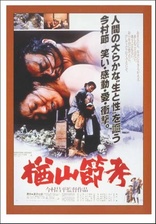
Price
Movie rating
7.8 | / 10 |
Blu-ray rating
| Users | 0.0 | |
| Reviewer | 4.5 | |
| Overall | 4.5 |
Overview
The Ballad of Narayama (1983)
In a small village in a remote valley where the harshness of life dictates that survival overrules compassion, elderly widow Orin is approaching her 70th birthday – the age when village law says she must go up to the mythic Mount Narayama to die. But there are several loose ends within her own family to tie up first.
Starring: Ken Ogata, Sumiko Sakamoto, Tonpei Hidari, Shôichi Ozawa, Fujio TokitaDirector: Shôhei Imamura
| Foreign | Uncertain |
| Drama | Uncertain |
Specifications
Video
Video codec: MPEG-4 AVC
Video resolution: 1080p
Aspect ratio: 1.85:1
Original aspect ratio: 1.85:1
Audio
Japanese: DTS-HD Master Audio Mono
Subtitles
English
Discs
Blu-ray Disc
Single disc (1 BD)
Playback
Region A (B, C untested)
Review
Rating summary
| Movie | 4.5 | |
| Video | 4.5 | |
| Audio | 4.0 | |
| Extras | 3.0 | |
| Overall | 4.5 |
The Ballad of Narayama Blu-ray Movie Review
Reviewed by Jeffrey Kauffman December 22, 2020 Note: This version of this film is available as part of Survivor Ballads: Three Films by Shohei Imamura.
Despite being the only Japanese director to win the coveted Palme d’Or at the Cannes Film Festival twice, Shōhei Imamura hasn’t seemed to
penetrate
into general public consciousness in quite the same way that, say, Akira Kurosawa, the Japanese director who won the Palme d’Or a couple of years
before Imamura’s first win, has. As much as France tends to be associated with the phrase “New Wave” (and/or nouvelle vague, as the
case
may be), Japan itself probably unsurprisingly had its own New Wave, and Imamura is often cited as one of its leading proponents. The fact that
one
of Imamura’s first independent features made without studio meddling was entitled The Pornographers may give some indication of how provocative Imamura’s content can be, but in some ways
Imamura is not the stylistic enfant terrible that some of his counterparts in France like Jean-Luc Godard and/or François Truffaut often
were.
Arrow Video’s Arrow Academy imprint has released three of Imamura’s fascinating films, and while some might have preferred that his “other”
Palme
d’Or winner, The Eel, might have been included along with his first film to take
home that prize, The Ballad of Narayama, this trifecta is certainly a fantastic introduction to Imamura for those previously unacquainted
with
him, and it’s also a worthy collection in its own right for those who are already fans of Imamura.
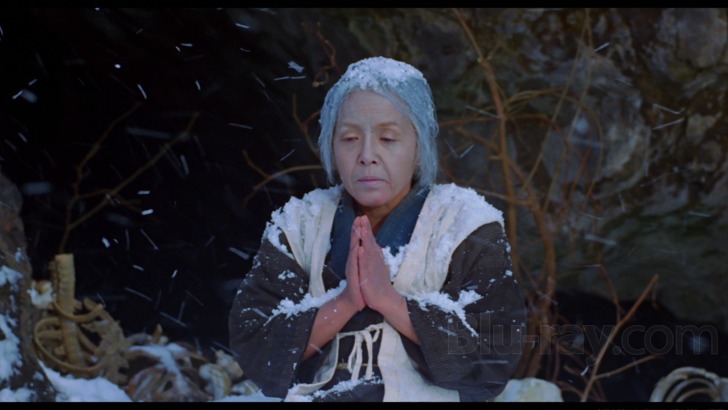
One of the more shocking moments in Midsommar (and avert your eyes now if you haven't seen it and want to avoid a minor spoiler) is when two elders in the Swedish cult at the center of the film ascend a high peak, indulge in some ritual blood letting, and then proceed to jump off of a cliff to their death (and/or extreme injury, followed by rather severe pummeling by others, leading to their death). With tongue obviously more than slightly in cheek, I might suggest that some Japanese folks might react to this scene with a hearty, "Yeah, well, we've been doing that for centuries, and we have a 'better' tradition that doesn't involve having such an incredible mess to clean up". In a plot conceit evidently based on actual Japanese practices that may remind some a bit of Logan's Run, those reaching a certain age are consigned to death, whether or not they're "ready" for it. If Logan's Run made that "transition age" a disturbingly young one, The Ballad of Narayama posits 70 as the tipping point where families engage in an activity known as obasute, where they deliver their elders to a mountain peak (the titular Narayama) to expire "naturally". In the case of the film, the character due for a date with a mountain peak is an old but still pretty spry woman named Orin (Sumiko Sakamoto).
As is addressed in two pretty substantial supplements included with this release, an "appreciation" by Tony Reyns, and a commentary by Jasper Sharp, The Ballad of Narayama is based on a novella by Shichirō Fukazawa, though a second Fukazawa piece is woven into the story as well, giving it some additional content that was not present in 1958's The Ballad of Narayama, which told the basic story within a kind of kabuki style. The added elements include a subplot involving a son of Orin named Risuke (Tonpei Hidari), who is a virgin despite being in his thirties, a condition perhaps made understandable by the fact that he evidently stinks to high heaven. With death approaching, Orin spends the last year or so of her life attempting to set things in order for her family, including trying to relieve Risuke of his virginity, in one strand of the film that is occasionally played for laughs, something that's a bit at odds with otherwise fairly melancholic and at times melodramatic plot developments, including Orin trying to arrange a marriage for her older, widowed, son Tatsuhei (Ken Ogata).
The film is often ravishing visually, and it offers a really fascinating look at a kind of quasi-feudal lifestyle (and, frankly, deathstyle). Imamura makes some probably none too subtle but still valid points about "the circle of life" and "the natural order" by interspersing the human story with various interstitials featuring various creatures. That may help to contextualize things, at least from a Japanese perspective, but it probably doesn't help alleviate the shock of a final sequence on a mountain that has more than one person dropping off a relative.
The Ballad of Narayama Blu-ray Movie, Video Quality 
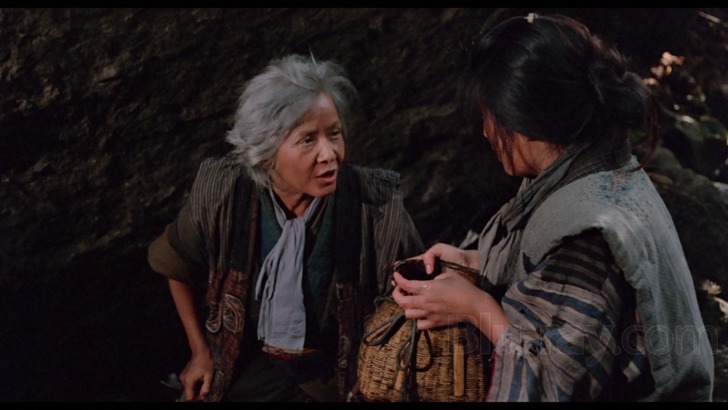
The Ballad of Narayama is presented on Blu-ray courtesy of Arrow Academy, an imprint of Arrow Video, with an AVC encoded 1080p transfer in 1.85:1. While Arrow's insert booklet offers a full page devoted to the restorations, because all three films in this are lumped in together, there's really not a ton of information offered other than the following:
The Battle of Nayarama / Narayama bushiko appears in its original aspect ratio of 1.85:1 with mono sound.Judging purely by screenshots, this does not appear to be the same master as was used Eureka Entertainment for their Blu-ray release of The Ballad of Narayama many years ago. The palette looks considerably better suffused, and doesn't have the brownish tint that is visible in some of the screenshots Svet included with his review of that release. Detail levels are very good to excellent throughout the presentation, with everything from the fibers on apparel to natural elements like leaves looking precise. There are a couple of kind of curious drops in image quality where things become noticeably more desaturated and fuzzier (see screenshot 19 for one example), but this is by and large a very pleasing looking transfer with no signs of digital tweaking, and a nicely organic appearance throughout.
The Battle of Nayarama and Black Rain were both restored from the original 35mm negatives by Toie.
The original mono soundtracks were remastered from the original sound elements by Toie.
The Ballad of Narayama Blu-ray Movie, Audio Quality 
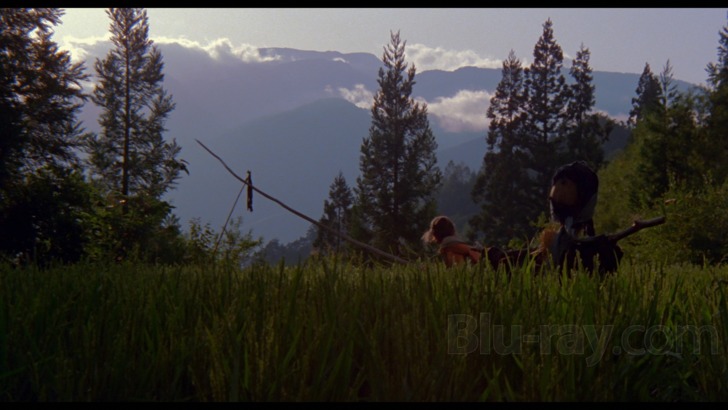
The Ballad of Narayama features a DTS-HD Master Audio Mono track in the original Japanese. A lot of this film plays in outdoor settings, and there often rather subtle but still effective ambient environmental sounds utilized that help to establish a realistic ambience. The film has some evocative scoring choices, including use of some ethnic and/or native instruments, and those sound clear and warm. Dialogue is rendered cleanly and clearly throughout this problem free track. Optional English subtitles are available.
The Ballad of Narayama Blu-ray Movie, Special Features and Extras 

- Audio Commentary by Jasper Sharp
- Age and Tradition (1080p; 47:53) is subtitled An Introduction to The Ballad of Narayama , and is a really well done appreciation of the film (and Imamura in general) by the genially informative Tony Rayns.
- Trailers
- Theatrical Trailer 1 (1080p; 2:52)
- Theatrical Trailer 2 (1080p; 2:32)
- Teaser Trailer 1 (1080p; 2:19)
- Teaser Trailer 2 (1080p; 1:08)
- Image Gallery (1080p; 7:10)
- Original Japanese Press Kit is available as BD-ROM content.
The Ballad of Narayama Blu-ray Movie, Overall Score and Recommendation 
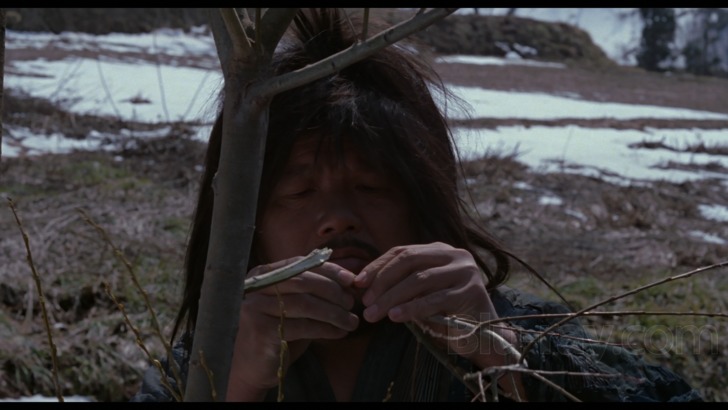
The Ballad of Narayama helped really establish Imamura on the international stage, something that Tony Rayns in particular states worked both to the benefit and detriment of Imamura's subsequent career. The film is undeniably vignette driven, with some sequences working better than others (some of the buffoonish stuff featuring Risuke left me personally kind of cold), but the overall effect is surprisingly devastating. Technical merits are solid, and the supplemental package very well done. Highly recommended.
Similar titles
Similar titles you might also like
(Still not reliable for this title)

The Insect Woman
にっぽん昆虫記 / Nippon konchûki
1963

Pigs and Battleships
豚と軍艦 / Buta to gunkan
1961

Black Rain
Kuroi ame
1989

Onibaba
鬼婆
1964

Vengeance Is Mine
復讐するは我にあり / Fukushû suru wa ware ni ari
1979

Zegen
1987

The Rocket
2013

Heart of Glass
Herz aus Glas
1976

The Marriage of Maria Braun
Die Ehe der Maria Braun
1978

Winter Sleep
Kış Uykusu
2014

The Only Son
一人息子
1936

About Dry Grasses
Kuru Otlar Üstüne
2023

The Ballad of Narayama
楢山節考 / Narayama bushikô
1958

Madame Bovary
1991

The Turin Horse
A Torinói ló
2011

Monos
2019

Dust in the Wind
戀戀風塵 / Lian lian feng chen
1986

The Tree of Wooden Clogs
L'albero degli zoccoli
1978

The Painted Bird
Nabarvené ptáce / Slipcover in Original Pressing
2019

Japón
2002